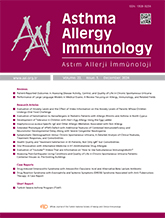


Objective: The Oral Food Challenge Test (OFC) is the gold standard for diagnosing or excluding food allergies. OFC in children may cause anxiety in the parents. The study aims to evaluate parental anxiety during children`s OFC, examining the impact of informational videos with instructions, comparing anxiety levels between tested children`s parents and healthy controls, and correlating parental anxiety with psychological symptoms.
Materials and Methods: The study included parents of children over 18 months of age undergoing OFC. All parents received verbal/ written test information and some got informational videos. State-Trait Anxiety Inventory (STAI) and Symptom Checklist-90-Revised (SCL-90-R) were used as questionnaires.
Results: The median age of the 44 patients included in the study was 25.3 (IQR:20.2-41.6) months, and the median age of the 23 healthy children in the control group was 30 (IQR:23.85-43.96) months (p=0.125). Among the parents of the patients undergoing OFC, 29 (65.9%) were informed verbally/with text, and 15 (34.1%) were additionally provided information through video. Fourteen (31.82%) of the patients had an anaphylactic reaction in their history, and 36 (81.82%) patients were tested to evaluate the development of tolerance. No significant differences were detected in the STAI-T and STAI-S scores between parents of the control group and those of the group undergoing OFC. No statistically significant difference was observed in the assessment of the pre-OFC STAI-S scores of the patients` parents between those who received verbal/written information and those additionally informed via video. Among the parents` of patients without reactions during OFC, a decrease was noted in the post-test STAI-S scores compared to pre-test scores. STAI-T scores of the parents of patients undergoing OFC exhibited positive correlations with the general symptom index, anxiety, obsession, depression, interpersonal sensitivity, psychosis, paranoid, anger, and phobia parameters, as determined by the psychological symptom screening scale.
Conclusion: As evidenced by our study, the absence of reactions during OFC resulted in a reduction of parental anxiety. The effect of additional video information with verbal and written instructions on anxiety remains unclear in this study. Limited sample size may be a factor; further research with larger cohorts is needed before making generalized conclusions.